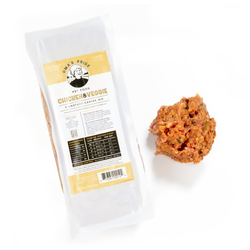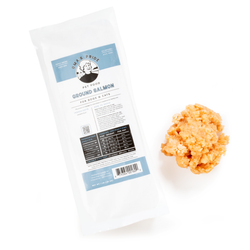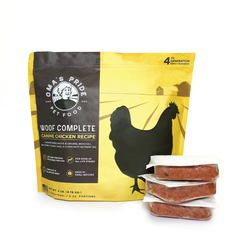7 Remarkable Ways Beef Liver Is Good For Dogs
Did you know that beef liver is beneficial for humans and dogs alike?
Beef liver is a staple worldwide, especially in Egypt, Africa, Asia, and Latin America. Although it has fallen out of favor in the United States, liver was historically promoted as a patriotic choice during World War II food rationing.
Although people in the USA often think of beef liver as a “scrap” part of the animal, it is actually an incredibly nutrient-dense organ loaded with vitamins and minerals.
You may be here to find out, “Is beef liver good for dogs?”
Yes, beef liver is excellent for dogs because it is rich in iron, vitamin A, B vitamins, zinc, copper, and choline. Liver is low in fat and offers many health benefits for the heart, brain, vision, bones, and muscles.
Pet parents can feed dogs beef liver daily as part of a balanced diet. The daily liver intake should not exceed 5% of a dog’s diet. Beef liver can also be served as a supplemental treat or as a raw topper on kibble.
Table of contents
- Beef liver 101
- Top vitamins, minerals, and nutrients in beef liver
- Ways to purchase beef liver
- 7 benefits of beef liver for dogs
-
Feeding instructions
- Main concerns
- Beef liver alternatives
Beef liver 101: definition and basics
Beef liver is a vital cow organ weighing about 10 to 15 pounds in an average-sized cow. Although the liver is only a small part of the animal, it is a nutritional powerhouse when eaten.
Beef liver is considered one of the healthiest organ meats due to its low fat content, high protein content, and rich nutrient profile. Although it’s the liver’s job to filter toxins in the body, the liver itself doesn’t store the toxins. This makes liver a safe and healthy choice.
Organ meat vs muscle meat
Liver is an organ, which is different from muscle meat. Muscle meat includes cuts like chuck, tenderloin, flank, shank, and more. Dogs need both muscle and organ meats as part of a balanced diet.
Muscle meat accounts for about 70% of a dog’s diet, while organ meat accounts for about 10%. Other organ meats include the kidney, pancreas, heart, brain, tripe, and tongue.
Organ meat is generally richer in iron, copper, selenium, riboflavin, vitamin A, and certain B vitamins than muscle meat. Organ meat also contains higher cholesterol levels. Both muscle and organ meats are generally higher in protein (especially heart and liver).
Finally, beef liver is typically less expensive per pound than a popular item like ground beef. This makes beef liver a cost-effective choice for most pet parents.
Top vitamins, minerals, and nutrients in beef liver

You may be surprised to learn just how healthy beef liver is when we break down the nutritional content.
Here are the top vitamins and minerals found in beef liver:
- Iron. Iron is critical for the heart, blood, and immunity as it carries oxygen throughout the body. It regulates collagen production, body temperature, and red blood cell count.
- B vitamins (B9, B12, and B2). Together, B vitamins like folate (B9), riboflavin (B2), and cobalamin (B12) support cognitive function, reproductive health, digestion, nerve health, and metabolism.
- Vitamin A. Vitamin A plays a role in many critical functions like digestion, vision, immunity, and preventing oxidative stress.
- Protein. Protein is essential for muscle development, tissue repair, and growth.
- Zinc. Zinc helps with immune and cell function and improves skin, joint, and bone health.
- Choline. Choline supports growth, nerve health, cells, and metabolism.
- Vitamin D. Vitamin D is a cornerstone of immunity, fighting diseases and strengthening bones and muscles.
- Copper. Copper allows the body to properly absorb iron. It’s also critical for skeletal health and connective tissue development.
Ways to purchase beef liver
Common places to purchase beef liver for dogs include online pet retailers, local butchers, independent pet retailers, and local co-ops or farms.
While you can purchase beef liver from a regular grocery store, depending on how it is stored and processed, it may not be safe for raw pet consumption.
Beef liver is sold in various forms, including as an ingredient in food mixes, as a freeze-dried treat or topper, dehydrated, or frozen raw.
Check out a few beef liver products from Oma’s Pride below!
Explore Products
Haven’t heard of Oma’s Pride? It is a fourth-generation family-owned and operated business. Since its humble beginnings in 1950 as a small poultry farm in Connecticut, Oma’s Pride has been committed to helping pets thrive through an optimal carnivore-focused raw food diet made of real, natural, unprocessed ingredients—as nature intended. All raw pet food is crafted in small batches without HPP in a USDA kitchen from trusted local sources.
How to source beef liver
When purchasing beef liver for your dog, aim for the highest quality available. Typically, a local butcher shop or a trusted pet retailer will sell the highest quality raw liver that is safe for pet consumption.
Grass-fed, free-range beef is always preferable to large commercial beef plants where animals are confined. Mass-produced beef liver can contain harmful substances, such as antibiotics, hormones, harmful bacteria, and pesticides, that we don’t want our dogs exposed to.
Especially if you decide to feed your pet raw liver, be sure you’re confident in the sourcing to ensure your dog isn’t exposed to anything harmful.
7 excellent benefits of beef liver for dogs
1. Boosts energy and cognition
Beef liver is an iron-rich food. Iron plays a vital role in keeping dogs healthy, functioning normally, and full of energy.
For example, four ounces of beef liver provides a dog with about 5,540 micrograms of iron. Dogs need about 227 micrograms of iron per pound of body weight per day, so four ounces of liver would provide a 45-pound dog with about half of the daily iron requirement!
Additionally, beef liver is rich in B vitamins, such as thiamine, cobalamin, niacin, and riboflavin. These vitamins are essential for cell function and energy production. B12 (cobalamin) and choline are also excellent for brain health and development.
Beef liver allows dogs to stay mentally sharp and energetic throughout all life stages.
2. Regulates blood and heart health
Vitamins and minerals rich in beef liver, such as iron, vitamin B12, copper, and potassium, work together to strengthen the blood and heart. They also ensure the optimal functioning of red blood cells.
Without proper iron intake, dogs can experience exhaustion, general weakness, an inability to focus, weight loss, and elevated heart rates.
Folate, found in beef liver, helps lower blood pressure, allowing blood to remain healthy and transport oxygen to the body.

3. Strengthens muscles, bones, and teeth
Similar to humans, dogs may experience joint stiffness and decreased mobility as they age. Foods like beef liver contain essential vitamins and minerals to strengthen bones and muscles.
Beef liver contains a high amount of phosphorus and calcium. Together, these two minerals create bodily homeostasis and bolster bone and teeth strength.
Beef liver also contains a lot of vitamin B12. Without sufficient levels of vitamin B12, dogs can experience negative impacts on motor and sensory functions, leading to muscle weakness and a lack of muscle mass.
4. Supports healthy vision
Beef liver is a fantastic source of vitamin A because animals store this vitamin in their livers. The type of vitamin A found in liver is also known as “preformed vitamin A,” which allows the body to use it immediately upon consumption.
Vitamin A is mainly responsible for cellular differentiation (helping cells transform into specialized cells). This vitamin helps keep eyes moisturized and lubricated, improves immunity, reduces eye inflammation, and helps prevent vision degeneration.


5. Improves immune function
Vitamins and minerals in beef liver, such as vitamin D, zinc, and copper, play a crucial role in supporting the immune system.
For example, vitamin D “can modulate the innate and adaptive immune responses. Deficiency in vitamin D is associated with increased autoimmunity as well as an increased susceptibility to infection” (source)
Zinc and copper are minerals that strengthen a dog’s immunity. Copper is antimicrobial, fighting bacteria and viruses in the body. Zinc enables cells to function normally and also possesses antibacterial properties.
6. Weight control and management
Whether you feed beef liver as a freeze-dried snack or as part of a larger meal, you can rest assured that it is a smart choice to help dogs maintain a healthy weight.
How?
Beef liver is low in calories, fat, and carbohydrates, while being rich in nutrients and high in protein. Pure beef liver is a natural alternative to processed options, which are often filled with added carbs and sugars. The nutrient density and high protein content make it a great reward to satisfy dogs without causing weight gain.
Sadly, over 50% of dogs in the United States are obese. Long-term obesity can lead to a shortened life and other health issues like heart disease, cancer, urinary problems, tissue degeneration, diabetes, and more.
Providing your dog with the best food sources, such as natural beef liver, is one of the most effective ways to support a healthy weight and minimize the harmful effects of obesity.
7. Fortifies the liver
Finally, beef liver is actually good for your dog’s liver. Your dog’s liver is responsible for critical tasks, including filtering bodily toxins and aiding in digestion.
According to traditional Chinese veterinary medicine and holistic practices, feeding your dog a particular organ (like beef liver) directly supports your dog’s liver.
Additionally, the rich choline content found in liver directly supports a healthy liver. “The liver is very sensitive to the availability of methyl donors in the diet, including choline. When deprived of these nutrients, the liver becomes fatty, hepatocytes die, fibrosis develops, and eventually foci of carcinomas appear” (source).
Feeding instructions: giving beef liver to dogs

How much beef liver can I feed my dog?
As a general rule of thumb (especially when feeding a diy or homemade diet), liver should make up about 5% of your dog’s daily diet. Other secreting organs (like the kidney, brain, and pancreas) should make up an additional 5% of the daily diet.
Your dog can eat beef liver daily in moderation. Liver is not a substitute for other parts of a balanced diet, such as muscle meat, edible bones, dog-friendly fruits and vegetables, and seeds.
Liver can also be fed as a treat or a meal topper as long as it doesn’t exceed daily limits. If your dog hasn’t tried liver before, introduce it slowly at first to avoid an upset stomach.
If you have a sensitive dog, consider introducing liver for the first time with a GI-supporting ingredient, such as bone broth, Digestive Support, 100% pumpkin puree, or spinach puree.
Should liver be cooked for dogs?
If you choose to feed your dog liver, you can feed it raw or cooked.
Although some pet parents are not comfortable feeding raw liver, it’s the most biologically appropriate for carnivorous dogs and contains more bioavailable nutrients. As always, when handling raw food, practice safe handling techniques, like washing your hands and surfaces after touching meat.
Why is raw liver better than cooked for dogs? Cooking liver destroys certain percentages of vitamins and minerals and denatures the protein content. For example, cooked liver contains less iron, B vitamins, vitamin A, magnesium, copper, and phosphorus than raw liver.
Cooked liver can also become tough to chew, while raw liver is easier to consume.
Main concerns about feeding liver
You may be wondering, “Is beef liver safe for dogs?”
Beef liver is generally safe for most dogs when consumed in moderation and in accordance with proper feeding guidelines. Over time, excess consumption of beef liver can lead to complications like copper toxicity or hypervitaminosis A.
If your dog has one of the following issues, be sure to consult your veterinarian or a holistic veterinarian to create a diet tailored to their needs.
- Addison’s disease. If your dog has been diagnosed with Addison’s disease, you may want to go easy on the liver because of the high vitamin A content. Addison’s is related to reduced hormone production in the body, which leads to greatly reduced adrenal function.
- Copper liver disease. Dogs with copper liver disease accumulate excess copper in their liver, resulting in inflammation and, ultimately, liver failure. Other liver issues or genetic mutations can cause this. Since beef liver is high in copper, you may need to reduce or limit its consumption in dogs with liver disease.
- Kidney disease. Since beef liver is high in phosphorus, dogs with kidney disease may need to limit their intake. Excessive phosphorus can accelerate the disease's progression.
- Certain medications. Excess liver consumption can impact some medicines, like antibiotics or antidepressants. If your dog is on a medication like this, consider chatting with your veterinarian about how much liver you can feed.
Copper toxicity and beef liver
If you follow the guidelines of feeding around 5% liver per day, your dog is unlikely to experience copper toxicity.
Additionally, the liver is rich in zinc, which “reduces the amount of copper your body absorbs” (source). Liver is naturally balanced with zinc to help dogs get the proper amount of copper, not more or less.
Copper toxicity occurs when there is an overload that accumulates in the liver, leading to liver disease. Symptoms of this toxicity include:
- Vomiting
- Diarrhea
- Unexpected weight loss
- Lack of appetite
- Excessive urination
- Jaundice
Please note that certain dog breeds are more predisposed to copper overload and copper liver disease than others. If your dog is a Bedlington Terrier, Skye Terrier, Dalmation, Doberman, West Highland White Terrier, or Labrador Retriever, consider limiting the amount of liver you feed them.
These breeds can still eat liver; you just need to be careful not to feed them excessive amounts.
Regardless of your dog’s breed, it’s always a good idea to regularly schedule bloodwork to ensure your pup’s vitamin and mineral levels are within the normal range.
Hypervitaminosis A and beef liver
Similar to copper toxicity, your dog is unlikely to get hypervitaminosis A (excess vitamin A) if you follow the homemade guidelines of feeding about 5% liver per day.
Hypervitaminosis A can lead to weakened teeth and bones through decalcification. Symptoms include:
- Lethargy
- Vomiting
- Diarrhea
- Seizures
- Increased or excessive thirst
- Sudden weight loss
Alternatives to beef liver
If your dog has a beef allergy or simply doesn’t like beef liver, there are other types of liver to choose from. Dogs can eat chicken, pig, venison, turkey, duck, lamb, or goat liver.
Although beef liver is probably the most popular of the bunch, chicken liver is a close second. How do they match up?
- Beef liver. Beef liver contains less fat, more carbs, and fewer calories than chicken liver. It also contains more copper, vitamin A, zinc, and a higher B2 and B12 content. Beef liver also has a denser texture and earthier flavor.
- Chicken liver. Chicken liver contains more fat, less carbohydrates, and more calories than its beef alternative. It also contains more iron, selenium, and protein. Chicken liver has a smoother consistency and milder flavor.
Check out Dog Signature Mixes and Ground Organ Blends from Oma's Pride with chicken, turkey, and lamb liver.
If your pup won’t tolerate plain liver, try using a whole-food organ supplement, a glandular support supplement, or a supplement containing liver, like Digestive Performance!
Comments
Beverly
Aug 18, 2025 at 10:07am
I have 3 dogs 2 are 10 years and I is 11. have been feeding them chickens leg and thighs with dry or can. or both. not too sure if this is as good as beef liver should I stop the chicken to just get beef liver ? they all could lose weight !! love. them.
Leave a comment
Your email address will not be published. Required fields are marked with *





















Oma's Pride
Aug 18, 2025 at 10:08am
Hello Beverly,
Thanks so much for your question! Both chicken (like legs and thighs) and beef liver can be part of a healthy diet for dogs, but they serve different purposes. Chicken can be a source of muscle meat as well as bone (in the case of entire legs); beef liver is a nutrient-dense organ meat that’s best fed in smaller amounts as a part of a balanced diet. It really comes down to balance.
If you’re a rotational feeder and include a variety of meats and organs, you can include beef liver and other chicken parts. You can also simply top dry meals with raw toppers like Beef Organ Rounds, Chicken Chunks, or Turkey Hearts for a healthy, nutritional boost. If your pups need to lose weight, portion size and what they’re eating is key (fresh-fed dogs tend to maintain better weight control).
Check out one of our Complete Meals with meat, organs, bones, veggies, and a special nutrient mix to take the complexity out of raw feeding.